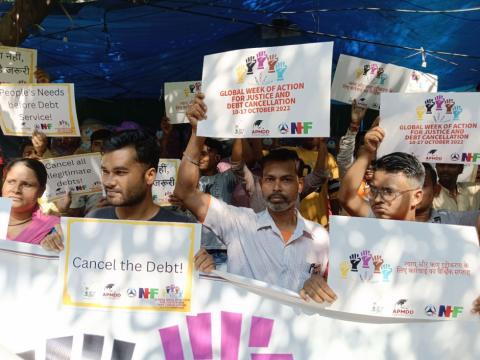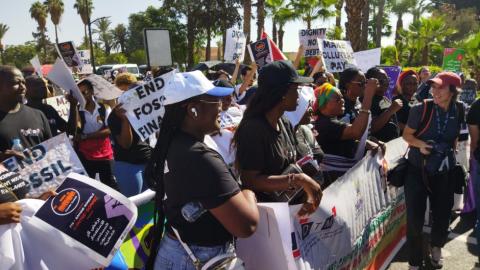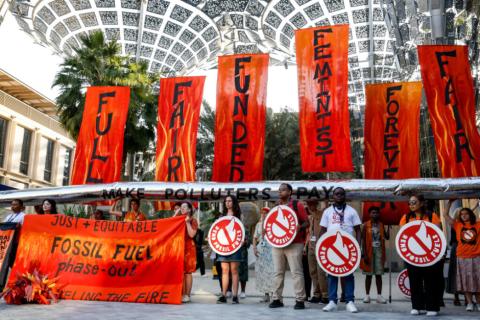
The World is Neglecting a Bombshell and the Global Movement Against Debt is Gaining Momentum
Authors Carolina Tamagnini (Fundeps); Salma Hussein (ESCR-Net individual member); John Mwebe (International Accountability Project;) Collins Liko (ESCR-Net)
How will the crippling debt burdens shape the conversations during the next Spring Meetings of the IMF and the World Bank (WB)? Scheduled from April 15th to 21st, 2024, in Washington DC, these meetings will gather, as usual, governments, multilateral, bilateral and private lenders, and other institutions to deliberate on the challenges facing the global financial architecture and hash out potential solutions. This gathering also presents an occasion for the global movement advocating for debt cancellation to keep raising our demands for debt justice, especially for Global South countries.
Activists calling for Debt Cancellation during the Global Week of Action for Justice and Debt Cancellation 2023. Photo @Asian People's Movement on Debt and Development (APMDD)
The Global Impact of Debt
According to the United Nations Conference on Trade and Development (UNCTAD), about 3.3 billion people – nearly half of humanity – now live in countries where expenditures on debt interest surpass allocations for education, health, and social security. In addition to being forced to deplete funds for essential public services, International Financial Institutions (IFIs) have imposed policy reforms on these same countries that further cut public spending, stripping away labor protections and workers’ rights, raising taxes, privatizing essential services and goods, among other austerity measures that disproportionately harm marginalized communities. Austerity and privatization especially affect women, reducing access to vital services and increasing unpaid care work, pushing many into personal debt. Furthermore, sovereign debt has denied the Global South the much-needed resources to address human rights and the damaging impacts of the climate and economic crises as the meager available resources have been prioritized for debt servicing and repayment.
Who's Behind the Global South Debt Burden
Here lies the real dilemma! The current sovereign debt crisis is the creation of Global North countries. As interest rates were lowered over the last decade, financial institutions encouraged countries to borrow. This led to a scenario where investors benefited from higher rates offered to more impoverished countries. However, when inflation hit rich countries, interest rates surged, subsequently burdening indebted countries with increased debt obligations. These heavily indebted countries, already grappling with the repercussions of COVID-19, rising food and energy costs, and economic slowdown, found themselves forced to divert public spending, notably slashing wages and social expenditures, to prioritize debt repayments.
The ramifications of this predicament are evident, with the majority of the population experiencing a decline in welfare. What's less apparent are the beneficiaries of such circumstances: investment banks, financial institutions, and affluent individuals who serve as the primary lenders to governments. Throughout, the IMF, often regarded as the linchpin of this financial system, has consistently championed the interests of these beneficiaries, albeit at the expense of hundreds of millions worldwide. This epitomizes what we term “debt injustice.”
Global Debt Crisis Deepens: Calls for Urgent Reform
Throughout 2023 and 2024, numerous countries faced crippling debt burdens. The Debt levels are particularly high in these lower middle-income economies, including Egypt at 92 percent of GDP, Angola at 84.9 percent, and Kenya at 70.2 percent.The UNCTAD alerted of a systemic debt crisis looming on the horizon and called for an urgent reform of the global debt architecture. This point was further emphasized by social movements, feminist groups, civil society organizations, Indigenous Peoples, and resisting communities during a “Counter Summit'' created as an alternative space to discuss the urgently needed reorganization of the global financial architecture. ESCR-Net, Eurodad, Debt Justice were among the global networks participating in the counter summit to amplify calls for centering human rights and ending unjust conditionalities imposed by the IMF and World Bank.
Activists during the march for debt justice organized by Counter Summit of Social Movements, Marrakech, Morocco 2023
Shaping Solutions for Debt Justice at the Spring Meetings
The upcoming Spring Meetings in April 2024 should provide a catalytic and strategic opportunity not only to delve into dissecting the diverse components of the global financial architecture amid the polycrises of debt, climate, and economic crises, but also to establish follow-up mechanisms to find solutions. Civil society groups will play a pivotal role by bringing alternative voices and concerns of communities and people affected by the unjust and illegitimate debt.
In general, IFIs insist on the effectiveness and relevance of the existing policies, supported by their own data, while dismissing external proposals that seek to confront neoliberal capitalism, financialization, and impoverishing economic policies and structures. On the outlook, there appears to be a semblance of agreement on upholding human rights, yet this often falls short in practice, due to the lack of reception from the IFIs to any criticism. There is an entrenched premise that human rights are an ideal that is difficult to fulfill rather than a legal obligation. However, the debt crisis has led to precariousness, and the context requires us to build a political movement against unsustainable and illegitimate debts and abusive conditionalities that continue to be detrimental to fundamental rights and people's lives. It also forces us to reflect on how this favors the growth of anti-democratic narratives and practices.
Nowadays, we are witnessing efforts to sustain an outdated framework designed to maintain colonial power in a world that has significantly changed since the end of the colonial era. We are concerned that these institutions' historical and neoliberal narratives and proposals have not changed much since the Bretton Woods Agreements, and they have continued to promote financial capitalism, leading to highly indebted countries. For example, the Loss and Damage Fund - the new funding mechanism to help countries address the impacts of climate change - will be hosted within the World Bank and pose the same issues as other loans-based funds, pushing countries who have contributed the least to the climate crisis into unsustainable debt.
Climate-vulnerable countries spend more money on fulfilling their debt repayment obligations than on climate mitigation and adaptation measures. In the photo, environmental human rights defenders and campaigners are holding signs reading "Make Polluters Pay" at COP28.
This year, the growing global movement against debt is calling on the IMF, IFIs and other financial players to seriously consider the proposals from voices opposing capitalism and neoliberalism and pursuing the recognition of human rights in development planning and financing. What is the limit for the imposition of neoliberal economic policies for countries facing unsustainable burdens of sovereign debts?
It has become self-evident that under the neoliberal hegemony of this financial capitalism driven by powerful private actors in wealthy nations, debt has become an increasingly powerful tool of economic imperialism, reshaping economic policies and facilitating ongoing dispossession to the benefit of narrow private interests.
Nevertheless, societies are changing: social movements are more empowered, patriarchal norms underpinning our society -reflected in the invisibilization and unfair distribution of care work- are increasingly being exposed, and there is now overwhelming evidence of the responsibilities of industrialized economies and corporate actors in causing the current climate change. It’s urgent to put forward solutions to advance debt justice, as many voices from civil society are calling for. The challenges are many, they are complex and involve a lot of political articulation. However, there is no sustainability of life possible under the neoliberal policies of austerity, impoverishment, and extractivism. We have to continue building collective narratives toward existing alternatives that center people and the planet, mobilizing and supporting communities to continue their struggle for their rights.


